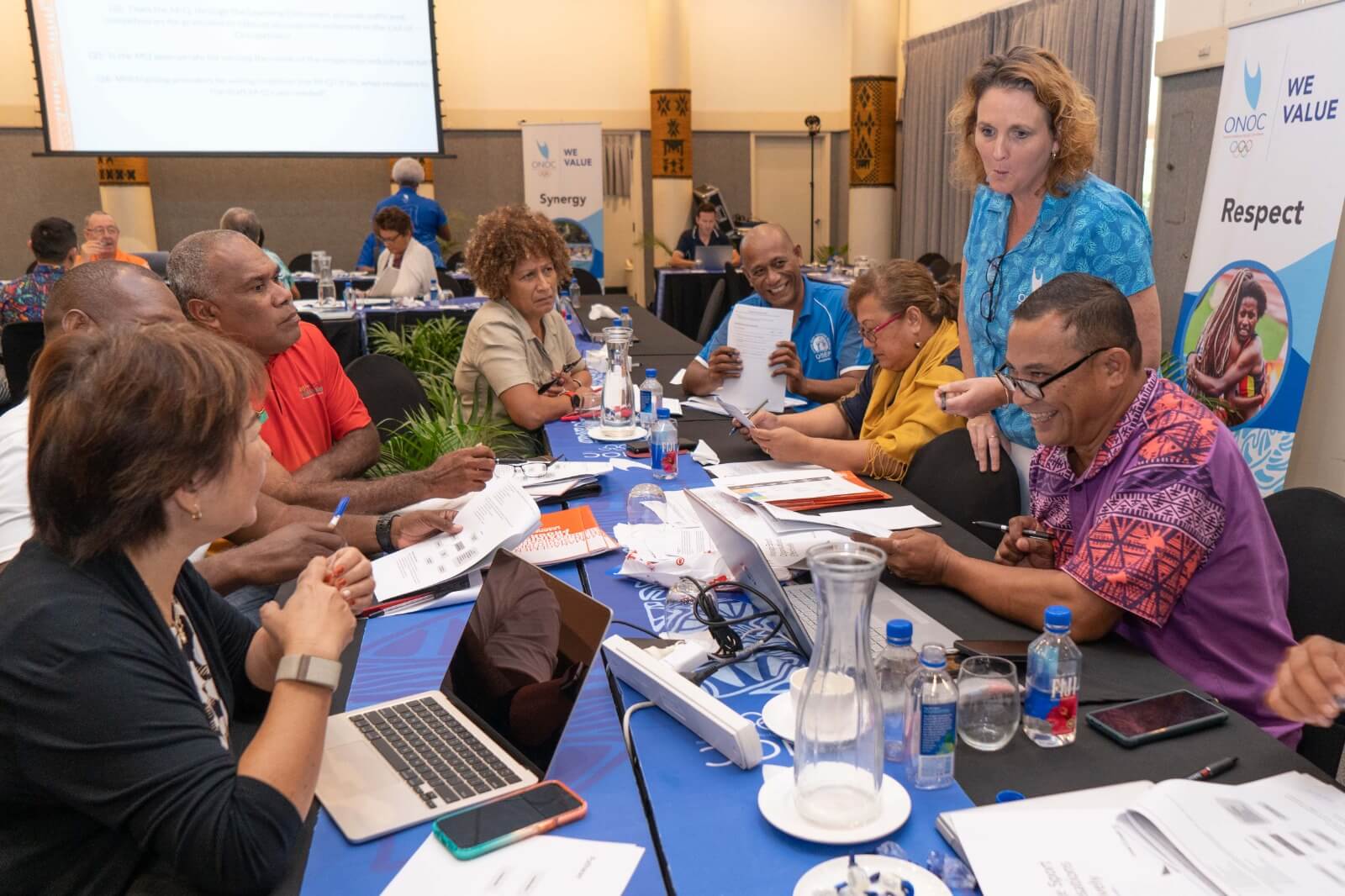The review and endorsement of sport education micro-qualifications is an advancement of Olympism and the Olympic values of excellence, friendship, and respect.
Review and endorsement of micro-qualification promotes Olympic Values
Speaking of behalf of the Oceania National Olympic Committees (ONOC) at the ONOC Stakeholder Endorsement Meeting for micro-qualifications for three Oceania Sport Education Programme (OSEP) micro courses, Meli Cavu, ONOC Chief Sport Education Programme Officer and Head of OSEP, reminded stakeholders that; “the process of accreditation put excellence on its sport education, extended respect through elevation of qualifications, and that whole exercise was performed in friendship with all stakeholders – for the benefit of athletes, entourages, and the growing, wider Pacific sport industry.”
“For ONOC, sport is not only about developing and taking the elite athletes of countries to the Olympic Games.

“Foremost among all its goals, the International Olympic Committee and the Olympic Movement has never wavered from its original purpose – to build peace through sport by the promotion of Olympism and the promotion of the Olympic Values; Excellence, Friendship and Respect.”
Cavu said; “For ONOC, every investment is toward this end – that wherever we can have ourselves as communities and countries run, jump, throw, wrestle, swim, or move the human body to the limits of its endurance — that it be a ground for building peace through excellence, friendship, and respect.
On the OSEP Programme
On the OSEP programme, Cavu added that, ‘‘While it was already recognised by the Olympic Movement as a flagship community-based sport education programme with relevance and potential for duplication in other regions of the world and in marginal settings of larger, more developed nations, OSEP was not recognised in the Pacific Islands.”
TIHRANI ULUINAKAUVADRA | Oceania Rugby | Partnerships & Pathway Manager
Tihrani Uluinakauvadra discusses the value of the Oceania Sport Education Programme (OSEP) in which he is a Regional Master Educator (RME). Uluinakauvadra is an IAC Member for the Strength and Conditioning Coaching component of micro-qualifications.
“This emerged as part of findings of an OSEP independent external evaluation in 2020, and the corresponding recommendation was that OSEP be accredited to the Pacific Qualifications Framework under the Pacific Community’s Educational Quality and Assessment Programme, or EQAP.
“An open call for sport industry experts to re-design of OSEP courses more than a year ago was done to see it fit that sport experts themselves engage in the exercise with curriculum and assessment professionals at SPC and in countries.
“Three micro-qualifications have been reviewed and endorsed in a meeting like this earlier this year – like this one, it brought in stakeholders of the Pacific sport industry together – some of them find themselves in this room again.”
SANDRA LOW | President | Guam National Badminton Federation
Sandra Low touches on the importance of financial management capacity in sports organisations. Low is a qualified accountant and is a member of the IAC for the development of the micro-qualification on developing fundamental financial services in a sports organisation.
Links to the ONOC BRISBANE 2032 Programme
Furthermore, Cavu said; “ONOC has launched its ONOC Brisbane 2032 Programme, a 10-year roadmap with a goal to get Oceania NOCs to perform higher and medal – a goal set at an ambitious 500%.”
“Using the lessons of the pre-Sydney 2000 Games where Pacific island athletes did not perform as envisaged despite training opportunities in Australia, the approach this time around, is to have a programme led and developed by Pacific Islanders, but in partnership with organisations and institutions in Australia, New Zealand, and in other settings within the wider Olympic Movement.
“The approach is to recognise what drives Pacific Islanders and how they may gain and retain optimum performance through physical, emotional, and mental high performance.
“To this end, OSEP and its fresh direction of creating and distributing micro-qualifications is a vehicle to drive this process and it goes well beyond Brisbane 2032.”
OSEP as a Pacific response to preparing athletes and entourage for cycles of Games at all levels
Cavu also provided the upcoming Games where both athlete and entourage development is critical: the Majuro 2023 Micronesian Games, the Solomon Islands 2023 Pacific Games, Paris 2024 Olympics, LA 2028 Olympics, leading up to Brisbane 2032 and beyond.
Cavu stated that; “The development of athletes is a never-ending, multi-generational endeavour, and the development of the sporting ecosystem through entourage development is even more significant now than ever before.”
“The development and professionalising of sport technical coaches, administrators, strength and conditioning coaches, managers, and chefs de mission – among a host of other ecosystem roles – is an industry in itself.

“OSEP was ONOC and the Olympic Movement’s response to this gap, and is now undergoing this process so that graduates are recognised and those interested may advance to higher education qualifications.
“And true to its original design, those who only pursue it for standard-gaining at community level still have the option to only pursue the micro-courses at the levels relevant to their desire and intent.”
–
Pleasevisit the following links for more information:
On the Oceania National Olympic Committees
On the Oceania Sport Education Programme
On the Pacific Community
On the SPC Educational Quality and Assessment Programme
Article adapted from the ONOC website.
